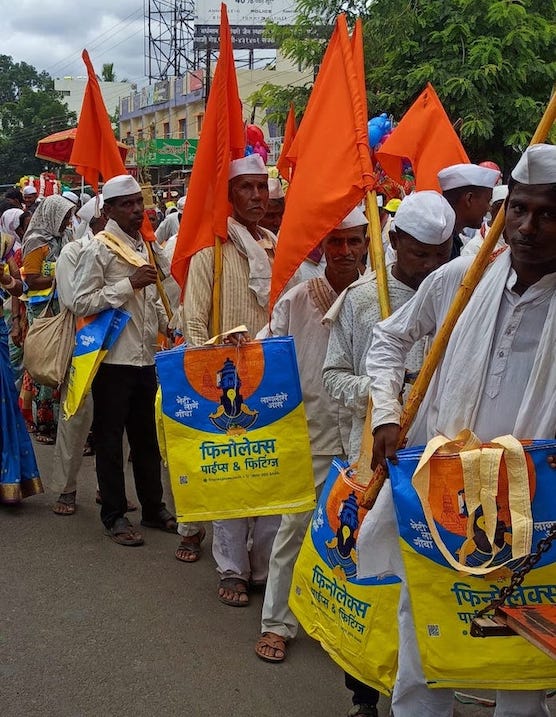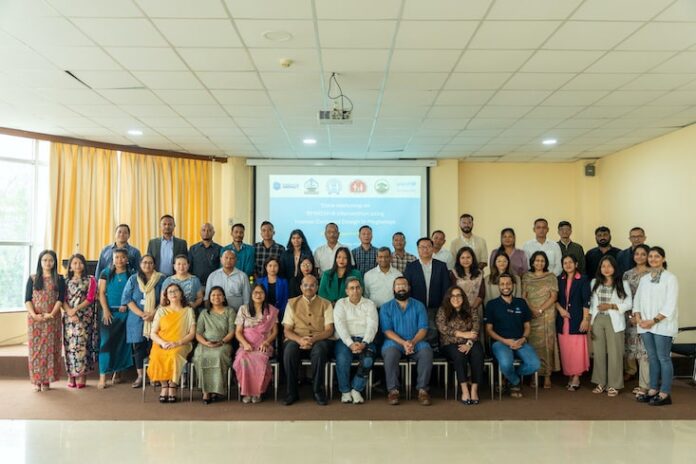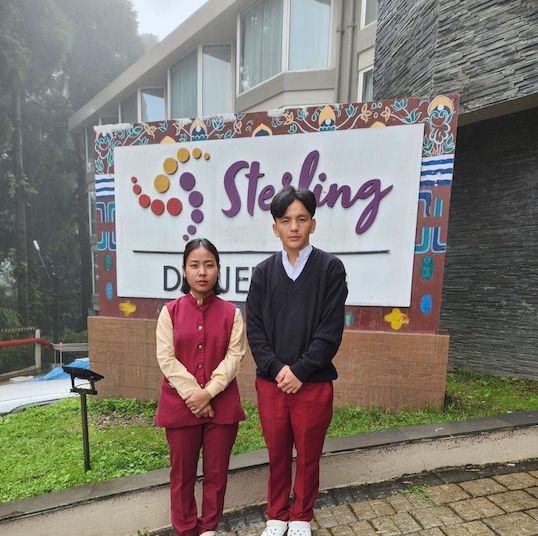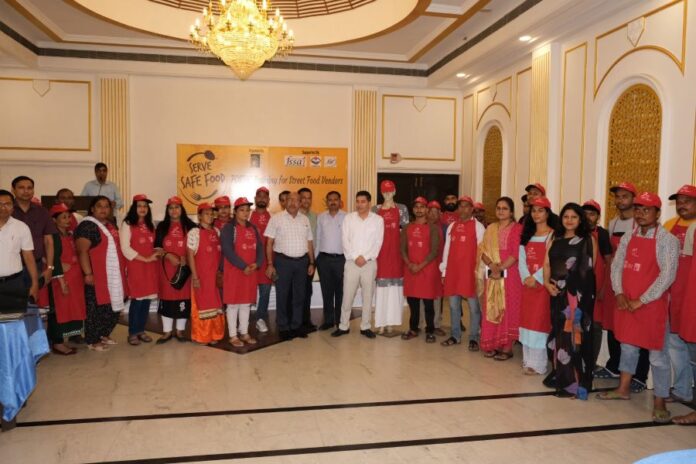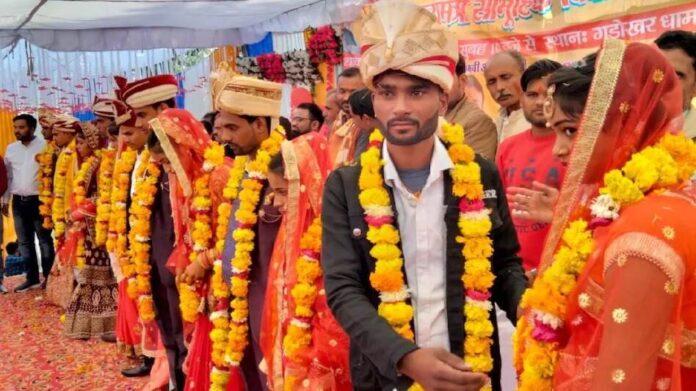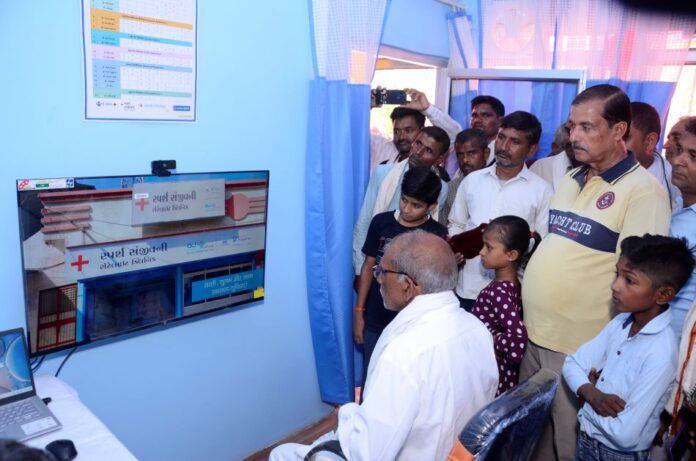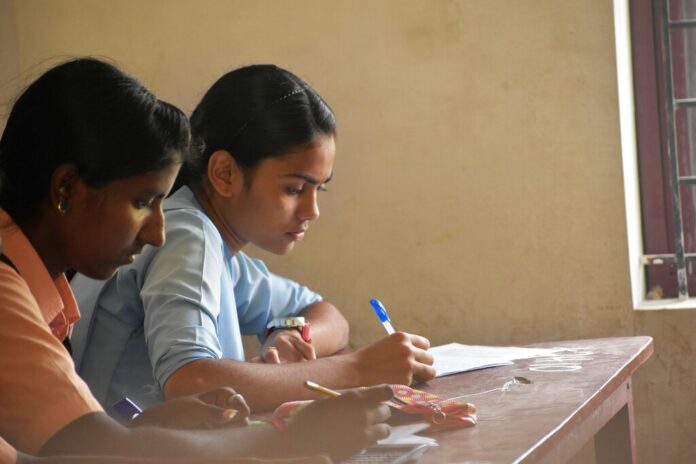CSR: Mukul Madhav Foundation Continued Its Long-Standing Tradition of Supporting Pandharpur Wari Yatra in 2024
Finolex Industries Limited, India’s leading manufacturer of PVC pipes and fittings, proudly announced its continued participation in the Pandharpur Wari Yatra for 2024, extending its support to this significant cultural and spiritual event in Maharashtra for more than 25 years.
The Pandharpur Wari, an 800-year-old tradition, saw millions of devotees undertake a 21-day pilgrimage on foot to the Vithoba temple in Pandharpur. As part of its ongoing commitment to this revered event, Finolex planned a comprehensive support program for the 2024 Wari Yatra. Finolex provided essential items to the Warkaris to enhance the comfort of pilgrims during their spiritual journey. These included large utility bags for carrying personal belongings, ponchos to protect from unpredictable weather, and Hari Path booklets to aid in their devotional practices. Recognizing the crucial role of law enforcement in managing this massive gathering, the company also distributed raincoats to police officers overseeing the event.
Healthcare was a priority during such a large-scale pilgrimage. To address this, Finolex’s CSR arm, Mukul Madhav Foundation (MMF), set up multiple medical camps at key locations along the Yatra route. These camps provided necessary medical assistance, ensuring the well-being of Warkaris throughout their journey.
Mr. Pradeep Shastry Vedula, President Sales & Marketing, at Finolex Industries Ltd., stated, “Our participation in the Pandharpur Wari is a testament to Finolex’s deep connection with Maharashtra’s agricultural community. For more than 25 years, we have been honored to support this 800-year-old tradition that brings millions together in a spirit of devotion and unity. This event allows us to engage in ‘Warkari Seva,’ which for us is equivalent to social work and paying homage to Lord Vitthal. This event is a unique opportunity for us to participate in a tradition that unifies people across all social strata. Our involvement goes beyond mere visibility; it’s about actively contributing to a cultural phenomenon that has brought communities together for centuries. As a company deeply rooted in Maharashtra’s soil, we see our involvement in the Wari as a continuation of our commitment to the communities we serve.”
This initiative reflected Finolex’s commitment to upholding traditions while supporting the communities it serves. As a company deeply rooted in Maharashtra and a leader in the agricultural sector, Finolex saw the Wari Yatra as an opportunity to reinforce its customer bond and contribute meaningfully to this significant cultural event.
Disclaimer: This media release is auto-generated. The CSR Journal is not responsible for the content.
Blockchain for Impact (BFI), in collaboration with the Government of Meghalaya, IIT Bombay and UNICEF, co-hosted a state workshop on Human Centred Design (HCD) in Meghalaya
The Government of Meghalaya, in collaboration with UNICEF, Blockchain for Impact (BFI) and IIT Mumbai successfully co-hosted a state workshop on Human Centred Design (HCD) in Meghalaya. This event marks the beginning of a fellowship programme that focuses on the deployment of social design fellows for public problem solving in public health at the district level.
This approach aligns with UNICEF and Blockchain For Impact’s (BFI) programme The India Health and Climate Resiliance Fellowship (IHCRF)’s focus on developing local sustainable solutions under the aegis of the State government. IHCRF looks to build primary health care using HCD featuring data, innovation and multi- sectoral approaches to ensure equity, efficiency to augment health systems.
The workshop included training District Health Associates (DHAs) posted in all the districts of Meghalaya. The training of the DHAs at today’s event focussed on the basics of health systems, data systems, multi sectoral programming and data analytics from the point of view of Government of Meghalaya’s health priorities. Over the course of this partnership, the capacity of the DHAs will be further built on aspects of HCD and problem solving for public health at the district level.
Teams from NHM, UNICEF and SHSRC also shared various data sets to help the DHAs understand gaps on the ground and priority areas that are of focus for the state of Meghalaya.
Mr. Ramkumar, IAS (MD, NHM and Secretary, Health and Family Welfare), representing the Health Department of the Government of Meghalaya, emphasized the importance of this initiative, stating, “State capacity is essential to enable our people to be fully productive. The HCD approach will empower our fellows to design and implement strategies that are tailored to the unique needs of our communities, addressing critical issues in health, nutrition, and rural development”, he also emphasised the role of the fellows in impacting the broader social determinants of health including rural development, the environment and intersectional aspects such as the socio-economic status of the community.
Nagakarthik, (VP, Blockchain For Impact) highlighted the transformative potential of this initiative. “By integrating human-centered design with cutting-edge technologies, we can create sustainable health solutions that are both effective and scalable. This fellowship program is a pivotal step towards achieving that vision and we look forward to working with the system towards enabling it.”
Luigi D’Aquino (Chief of Health, UNICEF, India), noted the collaborative effort behind this initiative. “UNICEF is proud to support the Meghalaya government in this groundbreaking endeavour. The program is a testament to the power of partnership in driving positive change. We are confident that the HCD approach will lead to innovative solutions that will significantly improve public health outcomes in Meghalaya.”
The event witnessed participation from various stakeholders, including government officials, health experts, and community leaders, all of whom are committed to making this program a success. The Meghalaya Government in partnership with UNICEF is the first attempt to scale the IHCRF pilot programme across the entire state.
Disclaimer: This media release is auto-generated. The CSR Journal is not responsible for the content.
CSR: Students from IIFL Foundation, Ministry of Defence supported Program in Arunachal Pradesh Secure Placement at Sterling Hotels
Six students from the Home Stay Training Program at Indira Gandhi Government College (IGGC) in Tezu, Arunachal Pradesh supported by IIFL Foundation, the National Cadet Corp (NCC) under the Ministry of Defence and REACHA have successfully secured placements at Sterling Hotels in Manali, Mussoorie, and Darjeeling.
The successfully placed students are Subani Meyor from Walong, Anjaw, Jija Mipi from Anini, Mawu Melo from Punli, Dibang Valley, Nuya Miso from Punli, Dibang Valley, Esuli Molo from Angrim Valley, Dibang and Pinika Taidong from Changlang, Changlang district.
Commenting on the successful placement of the students Mr. Pema Khandu, Chief Minister of Arunachal Pradesh said, “So happy to learn that 6 candidates – 5 girls and 1 boy – from IIFL Foundation supported Homestay Host Training Program at IGGC, Tezu, have been placed at Sterling Hotel at Manali, Mussoorie, and Darjeeling.”
Mrs. Madhu Jain, Director, IIFL Foundation said, “We are deeply honored by the recognition from the Chief Minister of Arunachal Pradesh. This acknowledgment reinforces our commitment to empowering communities through sustainable development. Thank you to Brigadier Bali, Indian Army, Government of Arunachal Pradesh, Trainers and the REACHA team for their unwavering support and counseling throughout this journey.”
Mr. Nikhil Pant, CEO, REACHA said, “These young trailblazers are not just taking a step forward in their careers but also inspiring other girls and boys to pursue opportunities beyond their hometowns. Best wishes to Subani, Jija, Mawu, Nuya, Esuli, and Pinika on their exciting new journey. Your success is an inspiration to us all!”
This is the first batch of the program that emphasizes on hospitality training, technical skills training as well as teaches essential soft skills such as communication, grooming and computer proficiency.
The home stay program was inaugurated in September 2023 in presence of General Officer Commanding 2 Mountain Division Lt. General M.S Bains, Mrs. Madhu Jain, Director of IIFL Foundation, Brigadier Dr. P.M Bali, Dr. Kangki Megu, Principal, IGGC Tezu, Local District Administration and Mr. Nikhil Pant, CEO, REACHA. Deputy Chief Minister Shri Chowna Mein, MP Shri Tapir Gao and others conveyed their wishes through video messages.
This is IIFL Foundation’s second such project after setting up successful hospitality and retail training centres in Kupwara district in Kashmir which has already provided jobs to local youth in reputed hotels and retail chains. Indian Army and government officials from center and state appreciated IIFL Foundations initiatives in these regions, where infrastructure and economic developments are a part of government’s agenda. The Ministry of Corporate Affairs in May 2023 had called for balanced CSR spending, particularly in the Northeast. Organizations like NCC, THSC, the District Commissioner’s Office and Ministry of Development of North East Region (MDoNER) support this initiative.
This project is aligned with Prime Minister Modi’s vision for Northeast development. IIFL Foundation with REACHA and NCC’s support is taking a vital step in this direction. Collaboration is central to MDoNER’s focus, setting an example for regional development. This initiative promises positive change, nurturing youth potential and creating a brighter future for Tezu and Arunachal Pradesh.
IIFL Foundation is well-known for its successful interventions in the areas of education, health, poverty alleviation and climate action among others. Through its various initiatives the foundation reaches over 10 lac beneficiaries.
Disclaimer: This media release is auto-generated. The CSR Journal is not responsible for the content.
CSR collaboration for the City-Farmer Partnership project in Chikkaballapur, Karnataka
Bangalore, India: Godrej Properties Limited, India’s leading real estate developer, partnered with the Chikkaballapur City Municipal Council (CMC) and the Indian Institute for Human Settlements (IIHS) for the City-Farmer Partnership project in Chikkaballapur, Karnataka to address the city’s waste management challenges and to promote scientific management of solid waste.
Focused on converting organic wet waste into valuable compost for farmers, approximately 759 tonnes of legacy waste was semi-processed into organic compost and supplied to 109 farmers across 17 villages of Chikkaballapur. The compost, processed from 1,000 cubic meters of waste, was provided at no cost to encourage the adoption of organic farming practices. Additionally, more than 569 tonnes of segregated wet waste has been processed through collaboration with 81 farmers.
A key aspect of this initiative and Godrej Properties’ focus is fostering a symbiotic relationship between urban and rural communities. To enhance and educate the farmer communities and stakeholders on the benefits of sustainable waste management practices, IIHS conducted multiple training sessions for more than 100 farmers on converting municipal waste into organic compost. Additionally, 45 CMC staff members were trained on key aspects of waste management. The training focused on the importance of segregated waste collection and transportation for the success of the city-farmer partnership project.
A series of ward-level and feedback meetings have been conducted as part of the City-Farmer Partnership for the Solid Waste Management (SWM) project to promote waste segregation at source. These meetings have been attended by CMC officials, the IIHS project team, Anganwadi workers, volunteers engaged in monitoring door-to-door collection of waste, and about 50 residents from each ward. To drive home the messaging and create awareness at the ground level, six street plays and a road show traversed key streets in Chikkaballapur, engaging citizens and commercial establishments with messages about the benefits of waste separation.
Mr. Rohit Mohan, Chief Design and Sustainability Officer, Godrej Properties Ltd., said “We recognize the substantial challenges posed for urban waste management, including growing volume of urban waste and improper waste segregation. Engaging communities through initiatives such as training farmers to convert municipal wet waste into organic compost is one of our important projects catering to our long-term environmental goals. This collaboration with Chikkaballapur farmers highlights our dedication to positively collaborate with multiple communities and contributing towards solid waste management across Urban local bodies. By enabling local communities to turn urban solid waste into valuable resources, we seek to drive enduring environmental improvements and support sustainable farming practices. As environmentally conscious developers, we remain committed to promoting sustainable waste management practices through public-private partnerships and engagement with local communities.”
Godrej Properties has been focusing on driving awareness and capacity building for the need for sustainable waste management across urban and rural communities in addition to sustainable waste management across all construction sites. In FY24 Godrej Properties successfully diverted more than 43,000 tonnes of waste from landfills achieving Net Zero Waste to landfill status.
Disclaimer: This media release is auto-generated. The CSR Journal is not responsible for the content.
CSR: Street food vendors to be trained under Project ‘Serve Safe Food’ in Uttarakhand
Uttarakhand, India: Expanding the geographical footprints of Project ‘Serve Safe Food’ in Uttarakhand, Nestlé India has continued its collaboration with Food Safety and Drug Administration (FDA), Uttarakhand, and National Association of Street Vendors of India (NASVI) to train over 1200 street food vendors in Dehradun, Chamauli, Rudra Prayag, Tehri Garhwal and Uttar Kashi districts, taking the total to 3,200 street food vendors in the state. Since its inception in 2016, Project ‘Serve Safe Food’ has benefitted over 68,500 street food vendors across 26 states and 4 union territories by bringing together various stakeholders to create a comprehensive training programme.
Mr. Taj Bar Singh, Additional Commissioner, FDA, Uttarakhand, said, “Street food vendors cater to a large section of the society. It is important for them to ensure food safety and hygiene, and Project ‘Serve Safe Food’ is positively contributing to this area. I am thankful to National Association of Street Vendors of India (NASVI) and Nestlé India for their continued partnership with FDA, Uttarakhand which is helping us elevate the food hygiene and safety standards in the state.”
Mr. Sanjay Khajuria, Director, Corporate Affairs and Sustainability, Nestlé India said, “Project Serve Safe Food embodies our commitment to improve the food safety environment by going beyond the quality and safety of our own products. The project has been working towards empowering the street food vendors by upgrading their skills through relevant trainings on hygiene and food safety practices. We are confident that we would continue to work closely with our partners and make a positive impact in the society.”
Nestlé India launched Project Serve Safe Food in 2016 and has trained street food vendors across states including Assam, Andhra Pradesh, Arunachal Pradesh, Andaman and Nicobar Islands, Bihar, Chhattisgarh, Delhi, Goa, Gujarat, Haryana, Himachal Pradesh, Jammu and Kashmir, Jharkhand, Karnataka, Kerala, Madhya Pradesh, Maharashtra, Manipur, Meghalaya, Nagaland, Odisha, Puducherry, Punjab, Rajasthan, Sikkim, Tamil Nadu, Telangana, Tripura, Uttar Pradesh, and Uttarakhand.
Disclaimer: This media release is auto-generated. The CSR Journal is not responsible for the content.
सामूहिक विवाह योजना का चाहिए लाभ तो अपनाएं ये प्रक्रिया
उत्तर प्रदेश में हर वर्ग की जरूरतमंद बेटियों के विवाह के लिए शुरू की गई सामूहिक विवाह योजना को और अधिक पारदर्शी तरीके से लागू करने के लिए समाज कल्याण विभाग ने नियम और प्रक्रियाओं को और अधिक पारदर्शी बनाने के लिए एसओपी तैयार की है। इसके अंतर्गत उत्तर प्रदेश के जिलों में सामूहिक शादी कराए जाने की स्थिति में जिलाधिकारी की मौजूदगी जरुरी होगा। आयोजन के समय पात्र जोड़ों की पुष्टि के लिए अलग से रजिस्ट्रेशन काउंटर के साथ मंडल के उपनिदेशक और नजदीकी जिले के समाज कल्याण अधिकारी भी मौके पर उपस्थित होकर समस्त व्यवस्थाओं का जायजा लेंगे और विभाग को रिपोर्ट देंगे।
इस 1 लाख जोड़ों की सामूहिक विवाह करवाएगी सरकार
उत्तर प्रदेश सरकार इस फाइनेंशियल ईयर में 1,06,911 जोड़ों के विवाह का लक्ष्य तय किया है। सामूहिक विवाह के लिए चुने गए कपल्स में से 10 प्रतिशत जोड़ों के रैंडम सत्यापन जिलाधिकारी के निर्देश पर राजस्व या अन्य विभाग के अधिकारियों द्वारा किए जाने के प्राविधान किए गए हैं। जांच प्रक्रिया को पुख्ता किए जाने के लिए जिले स्तर पर समिति को इसकी जिम्मेदारी दी गयी है। जांच के दौरान मौके पर उपस्थित आस पड़ोस के व्यक्तियों से पूर्व में विवाह न होने की पुष्टि की जाएगी, जिससे किसी भी दशा में अपात्र योजना का लाभ प्राप्त न कर सकें।
सामूहिक शादी में कपल्स को ये दी जाएगी मदद
सामूहिक विवाह समारोह में दांपत्य जीवन में खुशहाली एवं गृहस्थी की स्थापना के लिए लड़की के बैंक खाते में 35,000 रुपए दिया जायेगा। वहीं शादी के लिए जरुरी सामान जैसे कपड़े, बिछिया, पायल, बर्तन आदि पर 10 हजार रुपए साथ ही विधवा, तलाकशुदा के मामले में 5,000 रुपए तक की वैवाहिक सामग्री विवाह के समय ही प्रदान की जाती है।
सामूहिक विवाह के लिए ऐसे कर सकते हैं आवेदन
उत्तर प्रदेश सामूहिक विवाह योजना के अंतर्गत ऑनलाइन वेबसाइट https://cmsvy.upsdc.gov.in पर आवेदन कर सकते हैं। योजना के अंतर्गत लाभ पाने के लिए लाभार्थी आधार डेमोग्राफिक प्रमाणीकरण कर आवेदन कर सकते हैं। आवेदक अपना आवेदन पत्र जन सुविधा केंद्र (कॉमन सर्विस सेंटर), जिला समाज कल्याण अधिकारी कार्यालय, साइबर कैफे, निजी इंटरनेट केंद्र अथवा विभाग वेबसाइट से भरा सकते हैं। आवेदक द्वारा आवेदन विवाह की निर्धारित तिथि के कम से कम एक हफ्ते पहले ही करना होगा। आवेदन पहले आओ, पहले पाओ के आधार पर स्वीकार होगा। लड़का 21 साल और लड़की 18 साल से अधिक उम्र के होने पर ही ये आवेदन किये जा सकेंगे।
CSR: Sparsh Sanjeevani Telemedicine Clinics start operations in Talegaon, Maharashtra
Pune, India: Hyundai Motor India Foundation (HMIF) the CSR arm of Hyundai Motor India Limited (HMIL) has commenced operations of Telemedicine Clinics under its Sparsh Sanjeevani healthcare initiative in Talegaon, Pune, Maharashtra. Inaugurated by Shri Girish Mahajan, Minister – Rural Development & Youth Affairs and Sports, Government of Maharashtra, 5 Telemedicine Clinics will serve Pait, Kadus, Wada, Navlakh Umbre, and Sudumbre villages in Talegaon. These clinics will provide essential medical consultations and healthcare services remotely, augmenting primary healthcare infrastructure in such villages.
Speaking at the inauguration of Sparsh Sanjeevani Telemedicine Clinics in Maharashtra, Mr. Puneet Anand, AVP & Vertical Head – Corporate Affairs, HMIL said, “Under Hyundai’s global vision of ‘Progress for Humanity’, the Hyundai Motor India Foundation (HMIF) through its Sparsh Sanjeevani healthcare initiative has created a network of telemedicine clinics in the underserved corners of India, augmenting existing primary healthcare facilities. The 5 new clinics bolster the network to 40 tele-medicine clinics, operational in 8 states across India, with an aim to ensure that even the most isolated communities receive the care they need. Through diverse initiatives undertaken under HMIF, we will continue to sow the #SeedsOfGood in India, fostering sustainable development and promoting holistic societal growth.”
Hyundai Motor India Foundation’s Sparsh Sanjeevani public healthcare initiative was envisaged to boost India’s healthcare services in remote villages, by reaching the hinterland and making primary healthcare accessible to the underserved communities. Telemedicine clinics are nurse assisted clinics where patients are connected through video call with specialist doctors, providing remote specialist consultation in remote areas. Post consultation, each patient is provided with medicines by the on-ground nurse. This service is provided at a nominal charge of Rs. 100 per patient. The model also allows follow-up consultations.
Sparsh Sanjeevani telemedicine clinics are currently operational in the states of Maharashtra, Rajasthan, Gujarat, Madhya Pradesh, Odisha, Haryana, Uttar Pradesh and Uttarakhand. The initiative operates with a network of 40 clinics as of July 2024, spread over 8 states, collectively providing quality healthcare access to over 15 lakh people.
Disclaimer: This media release is auto-generated. The CSR Journal is not responsible for the content.

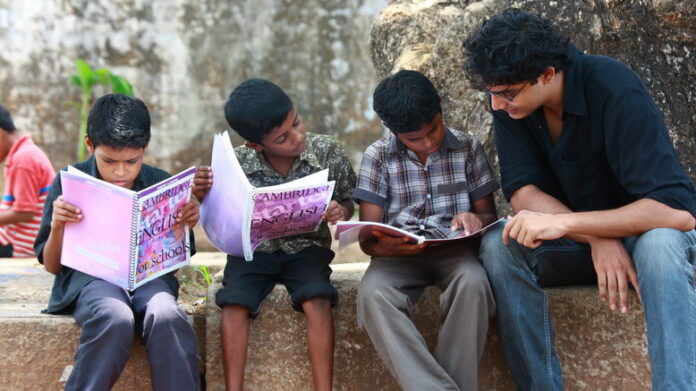
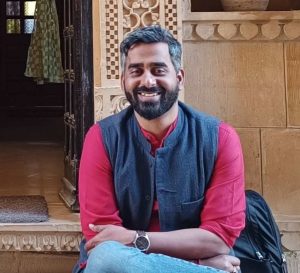 Mr. Gyan Prakash is Program Head, SBI Youth for India Fellowship program of SBI Foundation. He has been associated with the YFI family since 2015 and has been spearheading it with passion and belief ever since. Himself a YFI Alumnus from the 2015-2016 batch, he worked with rural businesswomen in the area of alternative livelihood in Uttarakhand with the partner NGO CHIRAG. An M.B.A. from IIT Kharagpur and a degree in B.E. (Computer Science and Engineering) from Birla Institute of Technology, Mesra, Ranchi, he brings with him the practical experience of over 12 years, which includes 9 years in the development sector and 3 years in the service sector.
Mr. Gyan Prakash is Program Head, SBI Youth for India Fellowship program of SBI Foundation. He has been associated with the YFI family since 2015 and has been spearheading it with passion and belief ever since. Himself a YFI Alumnus from the 2015-2016 batch, he worked with rural businesswomen in the area of alternative livelihood in Uttarakhand with the partner NGO CHIRAG. An M.B.A. from IIT Kharagpur and a degree in B.E. (Computer Science and Engineering) from Birla Institute of Technology, Mesra, Ranchi, he brings with him the practical experience of over 12 years, which includes 9 years in the development sector and 3 years in the service sector.
